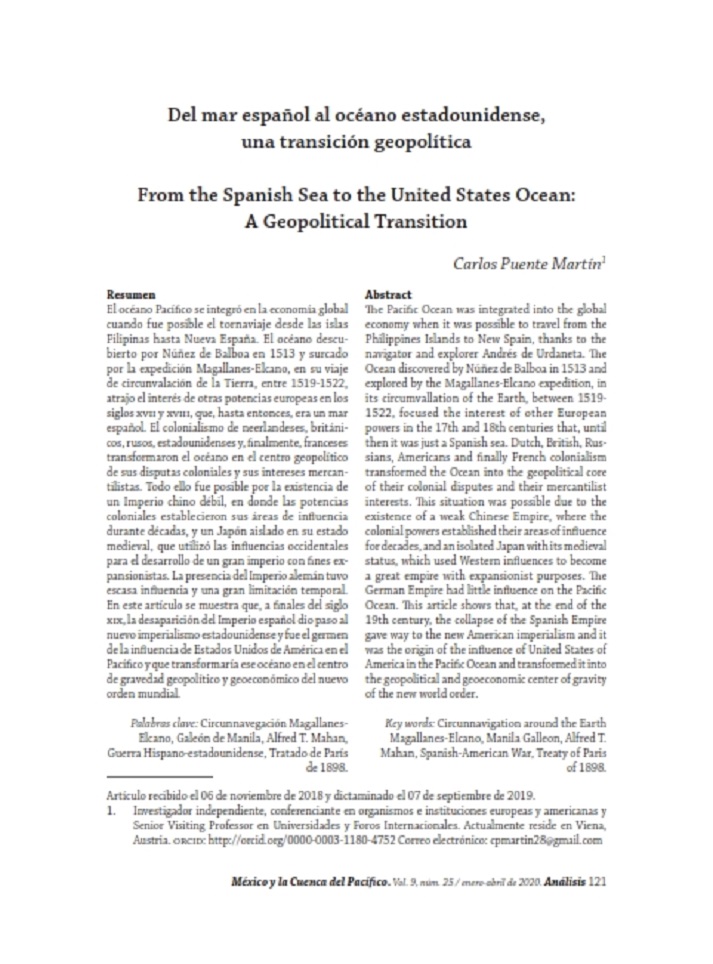From the Spanish Sea to the United States Ocean: A Geopolitical Transition
DOI:
https://doi.org/10.32870/mycp.v9i25.608Keywords:
Circunnavigation around the Earth Magallanes-Elcano, Manila Galleon, Alfred T. Mahan, Spanish-American War, Treaty of Paris of 1898Abstract
The Pacific Ocean was integrated into the global economy when it was possible to travel from the Philippines Islands to New Spain, thanks to the navigator and explorer Andrés de Urdaneta. The Ocean discovered by Núñez de Balboa in 1513 and explored by the Magallanes-Elcano expedition, in its circumvallation of the Earth, between 1519-1522, focused the interest of other European powers in the 17th and 18th centuries that, until then it was just a Spanish sea. Dutch, British, Russians, Americans and finally French colonialism transformed the Ocean into the geopolitical core of their colonial disputes and their mercantilist interests. This situation was possible due to the existence of a weak Chinese Empire, where the colonial powers established their areas of influence for decades, and an isolated Japan with its medieval status, which used Western influences to become a great empire with expansionist purposes. The German Empire had little influence on the Pacific Ocean. This article shows that, at the end of the 19th century, the collapse of the Spanish Empire gave way to the new American imperialism and it was the origin of the influence of United States of America in the Pacific Ocean and transformed it into the geopolitical and geoeconomic center of gravity of the new world order.Downloads

Downloads
Published
How to Cite
Issue
Section
License
Open Access Policy
This journal provides open access to all its contents, in adherence to the principle that making research freely available supports a greater global exchange of knowledge.
MyCP is licensed under a Creative Commons Attribution-NonCommercial license, also known as CC BY-NC.
Contents are published in both PDF and XML formats.
Authors who publish in México y la Cuenca del Pacífico must accept the following conditions:
Pursuant to Mexican copyright laws, México y la Cuenca del Pacífico acknowledges and respects the authors’ moral right and ownership of property rights, which will be assigned to the University of Guadalajara to publish the articles in an open-access mode.
México y la Cuenca del Pacífico does not charge the authors any fees for receiving and processing their articles.
Authors are permitted to enter into other independent and additional contractual agreements for the non-exclusive distribution of the article version published in México y la Cuenca del Pacífico (for example, publishing it in an institutional repository or in other printed or electronic media) as long as they clearly state that the piece was originally published in México y la Cuenca del Pacífico.
Pursuant to the above, once the article is approved for publication, authors must send the Assignment of Rights Agreement form duly filled and signed. This form must be sent to mexicoylacuenca@gmail.com as a PDF file.
Readers/users of México y la Cuenca del Pacífico can freely access the journal new issues as soon as they are uploaded. Readers/users are allowed to cite, share (both electronically and physically), print and distribute the material, provided they expressly state that the work was originally published in México y la Cuenca del Pacífico. Contents are to be properly cited and never for commercial purposes.




